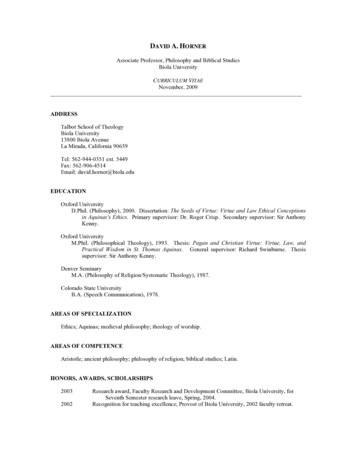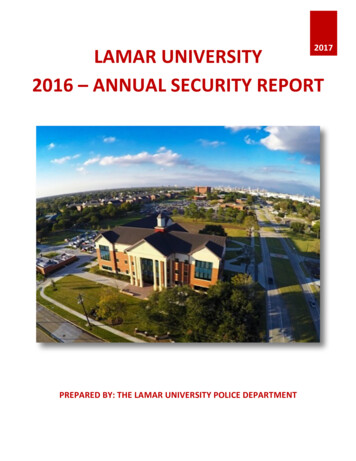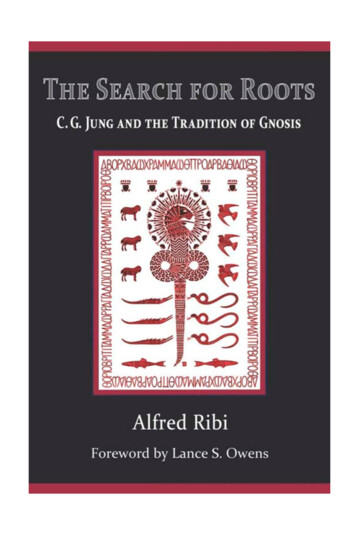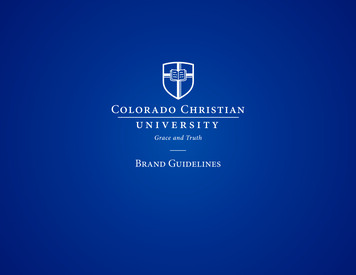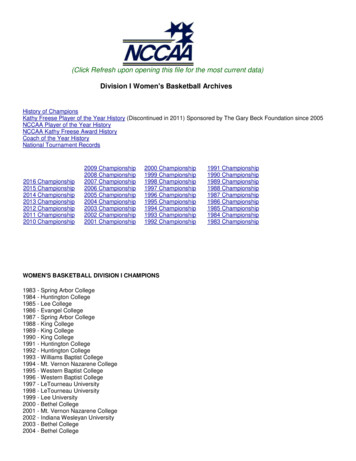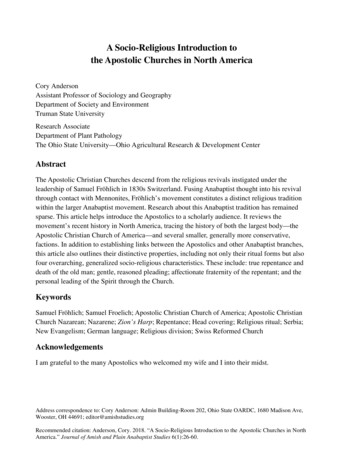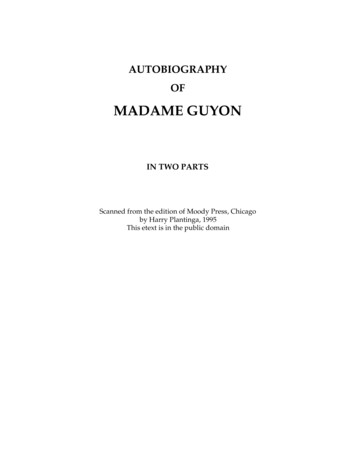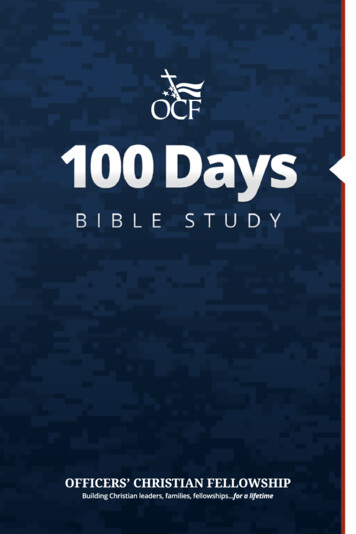
Transcription
ForewordThese notes are not in any way intended to be read instead of theBible, but are written as an aid to Bible study. You may use them as adaily devotional, or as a more thorough Bible study.If full value is to be obtained from them, it will be necessary to lookup the various references and really study the subjects, and notmerely read them. Although the notes are divided into 100 individualstudies, there is no need to feel tied down to various divisions. Forinstance, Studies 44 and 52 contain enough material for several day’swork. On the other hand, it will be helpful to consider the generaloutlines of Studies 90 and 95 at one reading.When reading, a practical help is to ask yourself, “Is there for metoday. A command to obey? A prayer to echo? An example to follow? A promise to claim? A gift to accept? A sin to avoid? An ideal to obtain? A truth to believe? A lesson to learn? A warning to heed?Almost always one or more of these questions will be applicable. Youwill find it helpful to pray about these points in your own life, and asyou pray for others (it is helpful to keep a daily list), pray about thesepoints for them, too.
100 DaysBIBLE STUDYcompiled byLieutenant General Sir Arthur Smith, KCB, KBE, DSO, MCEditions1924, 1947, 1927, 1952, 1932, 1958, 1937, 1961, 1944, 1965, 1992, 2001, 2013Captain Arthur Smith, Coldstream Guards, was Adjutant of the Royal Military College,Sandhurst, from 1921 to 1924. During that time he realized the need for a book to helpGentlemen Cadets understand their Bibles. He therefore compiled “100 Days” of whichover 120,000 copies have been printed, and which has been translated in whole or inpart into several different languages.Suggestions for the improvement and development of “100 Days” are welcomed by theOCU/AFCU.Copyright 2013, Officers’ Christian Union/Armed Forces’ Christian Union,all rights reserved.Reproduced by Officers’ Christian Fellowship of the United States of Americaby permission of the Armed Forces’ Christian Union, United KingdomUnless otherwise noted, Scripture quotations are from The Holy Bible, NewInternational Version Anglicized, NIV Copyright 1979, 1984, 2011 by Biblica, Inc. Used by permission. All rights reserved worldwide.Bible Version Abbreviations used in 100 DaysAV—Authorized VersionNIV—New International VersionRV—Revised VersionRSV—Revised Standard VersionTable of ContentsSECTION A ::: CHRISTIANITY7789910101112Day 1. Christianity and Other ReligionsDay 2. Man’s NeedDay 3. “Religion” does not satisfyDay 4. The World’s NeedDay 5. Christianity is not selfishDay 6. The Superlatives of ChristianityDay 7. The ChurchDay 8. Moral CourageDay 9. Physical Bravery1213131414151617181819Day 10. The barrier between God and manDay 11. The horror of sinDay 12. How sin cameDay 13. How “Sin” and “Sins” differDay 14. What sin isDay 15. The Philippian JailerDay 16. NaamanDay 17. The Bronze SnakeDay 18. MephiboshethDay 19. The Resurrection and AscensionDay 20. Knowing, not hoping202022222324252626272828292930SECTION C ::: HOW TO LIVE THE CHRISTIAN LIFEDay 21. The Holy Spirit—a PersonDay 22. The Holy Spirit—a PowerDay 23. Sacraments (“The means of grace”)Day 24. BaptismDay 25. Holy CommunionDay 26. Our ArmorDay 27. What the Bible claims for itselfDay 28. Our Lord and the ScripturesDay 29. Interdependence of the Old and New Testaments (1)Day 30. Interdependence of the Old and New Testaments (2)Day 31. Interdependence of the Old and New Testaments (3)Day 32. How to Study the Bible (1)Day 33. How to Study the Bible (2)Day 34. How to Study the Bible (3)Day 35. The Parable of the “Soil”SECTION B::: SIN
3131323233333434353636373839Day 36. The Prodigal SonDay 37. When to PrayDay 38. Unanswered PrayerDay 39. The Lord’s PrayerDay 40. Hindrances to Prayer—SinDay 41. Hindrances to Prayer—AnxietyDay 42. Hindrances to Prayer—Lack of “thought-control”Day 43. Hindrances to Prayer—Lack of sincerityDay 44. Hints on PrayerDay 45. Expect a “rough time”Day 46. Witness by lip and by lifeDay 47. Example and InfluenceDay 48. CourageDay 49. Tact3940Day 50. Saul’s incomplete obedienceDay 51. The ON E ::: DIFFICULTIES AND EXCUSESDay 52. “I don’t understand”Day 53. An intellectual difficultyDay 54. IntellectDay 55. “It is all too simple”Day 56. “I am too weak a character”Day 57. “There is too much to give up”Day 58. “My temptations indicate my wickedness”Day 59. “My temptations are too great to overcome”Day 60. “I have failed so often”Day 61. “Many Christians are insincere”Day 62. “Christians are narrow-minded”Day 63. “Christians are eccentric”Day 64. “I will be laughed at”Day 65. False ModestyDay 66. The Deity of Jesus ChristDay 67. The TrinityDay 68. The Bible and Science53545555Day 69. The Necessity for ServiceDay 70. The Motive for ServiceDay 71. Our “Works”Day 72. Half-heartednessSECTION D ::: SEPARATIONSECTION G ::: THE RESULT OF CHRISTIANITY56565757585859606161Day 73. The Fruit of the SpiritDay 74. LoveDay 75. JoyDay 76. PeaceDay 77. PatienceDay 78. KindnessDay 79. GoodnessDay 80. FaithfulnessDay 81. GentlenessDay 82. Self-Control62636464656667Day 83. PeterDay 84. “Swollen Head”Day 85. EfficiencyDay 86. Playing with SinDay 87. False DoctrinesDay 88. HypocrisyDay 89. Backsliding697070717172Day 90. World ProphecyDay 91. The Second ComingDay 92. The Judgment of the “works” of true ChristiansDay 93. The Departure of the Holy SpiritDay 94. The MillenniumDay 95. The Judgment of the Great White Throne7374757677Day 96. The DispensationsDay 97. Overseas MissionsDay 98. Sunday ObservanceDay 99. The Christian and WarDay 100. God’s plan of Salvation80Methods Of Bible Study82Suggested Subjects for Bible StudySECTION F ::: SERVICESECTION H ::: WARNINGSSECTION I ::: PROPHECYSECTION J ::: VARIOUSAPPENDIX AAPPENDIX B
SECTION A ::: CHRISTIANITYDay 1. Christianity and Other ReligionsRomans 12Today’s chapter is just “Christianity.” Christianity differs from other religions infour chief respects.a. Christianity is based on love: God seeks man.Other religions are based on fear: man seeks God. See Study 74.b. Christianity starts where other religions end.The latter concern themselves much with man’s efforts, throughout life, to reachthe standard required by the deity he worships. Christianity starts when manaccepts the free salvation made available by the sacrificial death of Jesus Christ.Thus man at the outset is reconciled to God and—his sin having been pardoned(see Studies 10-18)—he is accounted as having reached the necessary standardof righteousness required by God (2 Corinthians 5:21). This is the start of theChristian life, not the end. We work from and not to the required standard.c. Christianity and womanhood.Christianity puts womanhood in a totally different position from that which itoccupies in other religions. Chivalry, courtesy and respect for women, who aredescribed as physically weaker but equal heirs of the gracious gift of life, (1 Peter3:7, Galatians 3:28) are hallmarks of Christianity.d. Christianity has a unique power for good.Christianity is the only religion, which, in laying down a standard of life, givespower for man to reach that standard. See Studies 13 and 22. Although creed isthe basis of character and conduct (for ultimately a man’s actions are the result ofwhat he believes) remember that Christianity is centered in a PERSON and is notlimited to a mere CREED. We do not necessarily need to become more “religious,”but we do need to become more like Christ. Some men may laugh at “religion,”but only ignorant fools laugh at the Lord Jesus Christ. Jesus Christ lives today(Hebrews 7:25). Buddha, Confucius, and Mohammed are all dead.Day 2. Man’s NeedEcclesiastes 6 and 12:8-14A man consists of three parts: The physical—his body; The mental—his mind;The spiritual—his soul.100 Days ::: 7
A “religious tendency” exists in every person, and is evidenced by the fact that maneverywhere has some kind of god that he worships. In fact, man either worshipsthe God who made him, or the god he has made.A man, therefore, who only exercises the physical and mental portions of himself,and who neglects God or substitutes a god for the God, is only two-thirds aman, or, to use a slang phrase, is “not all there.” To be a man, no part can beneglected, for each is to some extent dependent on the other two for complete andproportional development. A three-legged stool is most stable if all three legs arethe same length. (See 1 Thessalonians 5:23 and Study 82.)In the first part of today’s study we see such “gods” as riches, wealth, honor andworldly prosperity which, though not necessarily wrong in themselves, are of littleor no value in and by themselves. They are “Vanity of vanities” (AV), “Meaningless,meaningless” (NIV)—Ecclesiastes 12:8. The conclusion expressed in 12:13 showsclearly that to enjoy the true values in life we must “Fear God and keep Hiscommandments” (see last part of 2 Chronicles 26:5).Day 3. “Religion” does not satisfyActs 8:26-40Do not mistake “religion” for Christianity. Some people are “slightly religious” anduse their religion as a cloak of respectability, or as a sedative or insurance to quietthe conscience. Others are very religious and yet do not know Christ. Paul was anexample (Acts 22:3) and in today’s passage note specifically the words “to worship”in v. 27. The Ethiopian was a religious man. The same verse shows that he was astraight, trustworthy courtier, yet evidently he was not satisfied. Light came whenPhilip “told him the good news about Jesus” (v. 35). Jesus means Savior; that waswhat the Ethiopian needed.“Religion” is a means to an end, and not an end in itself. “True religion” is to putthe individual into personal touch with God through Christ, and to maintain thattouch. Unless this is achieved, it is a failure. Verses 26 and 27. An instance of Divine guidance. No delay in obeyingextraordinary orders.Verse 31. The Ethiopian was humble enough not to resent the interference ofa dust-stained traveler.Verse 32. He was reading the very passage in Isaiah most likely to bring himpeace (Isaiah 53:7-8).Verse 37. (AV) Belief with the heart, not with the head.Verse 39. He had found the secret of true joy.8 ::: 100 DaysThe Angel (v. 26), the Spirit (v. 29), the Bible (v. 32), and Philip were all used inbringing light to the Ethiopian. A man can be “religious,” and go to church, etc.,but miss the point that he must go to Christ for Life. See John 5:39-40.Day 4. The World’s NeedJohn 15:1-16God’s standard is more important than the standard of living but causes lessconcern. Until nations acknowledge the Prince of Peace, wars are inevitable(Isaiah 9:6). Yes, we have neglected God, who alone can put right all that is soterribly wrong in the world today (Jeremiah 2:13).But we sometimes forget that for this purpose He wants to use us, and if we areto be used by God we must see to it that we are fit to be used (2 Timothy 2:21); inother words, that we are in touch with Him. We must therefore be Christians infact and not merely in name. Remember that by definition only Christ’s disciples(actual followers) are real Christians (Acts 11:26).It is our duty “to bear fruit,” and in this connection note verses 4 and 5 (especiallythe last sentence), and verse 8. Also see Study 73. The Scofield Reference Biblepoints out that there are three conditions for the fruitful life: cleansing vv. 2-3;abiding (RSV) v. 4; obedience vv. 10 and 12.It is vital that we get right with God, and that we keep right with Him if our livesare to have any meaning or value (Matthew 7:21). “Not everyone who says butonly he who does the will of my Father.” Obey—abide—abound.Day 5. Christianity is not selfishMark 5:1-20Some people say that men attempt to get right with God simply in order to be sureof getting to heaven. If “salvation” ends at that, then indeed it is selfish. But it doesnot end there. It is only the beginning. It is, in fact, the first necessary step for theman who wants to help others; for how can anyone really be the greatest help toanother, if he himself is not right with God? We need “salvation” then, not onlybecause God wants us to have it—and we are disappointing Him if we do not takewhat He offers—but also to help others. We need it, not so much “in case we die,”but much more “in case we live.” We are “saved to serve,” and that is what JesusChrist told the demoniac in Matthew 4:19.Further, a life which contributes (Galatians 5:22-23) to the solution of the world’sproblems cannot be selfish, and “risking our lives” is the opposite to “safety first”100 Days ::: 9
(Acts 15:26). Christianity gives purpose to men and women who have everythingto live with but nothing to live for.See note on Study 70, also John 1:40-41.Day 6. The Superlatives of ChristianityMalachi 3:7-10God wants us to put Him to the test, and longs to pour out unlimited blessings onus, and through us to others. But note that the condition is Complete Surrender:“Bring the whole tithe into the storehouse” (v. 10). If Jesus Christ is not Lord of all,He is not Lord at all. This is the same truth as the first of the 10 Commandments—“You shall have no other gods before me” (Exodus 20:3). See also Luke 14:33.Look up the following superlative verses:True happiness. Psalm 146:5Absolute cleansing. Isaiah 1:18Abundant pardon. Isaiah 55:7Sin conquered. Romans 6:14Life abundant. John 10:10Glorious freedom. Romans 6:18; 8:21More than conquerors. Romans 8:37Generously enriched. 1 Corinthians 1:5; 2 Corinthians 9:11Continuous victory. 2 Corinthians 2:14All-sufficient grace. 2 Corinthians 9:8; Romans 5:20Complete redemption. Galatians 3:13; 4:5Unlimited power. Ephesians 1:19; 3:20Boundless love. Ephesians 3:19; Romans 8:35-39Peace unbelievable. Philippians 4:7Every need supplied. Philippians 4:19Real wisdom. James 1:5Joy unspeakable. 1 Peter 1:8children of God” (Romans 8:21). Therefore “the Church” consists of all people,clergy and laity—irrespective of nationality, color, sex, age, denomination orintellectual ability—who (responding to the call) have been “born again” (John3:3) by personal faith in the Lord Jesus Christ as Savior (John 3:7, Acts 20:28).And so all real Christians (as opposed to those in name only) form “the Church”which is “the body of Christ.”See 1 Corinthians 12:27-28, Colossians 1:18 and 24.You enter the Church through Christ, and not Christ through the mere externalordinances of a religious organization. When a local church is filled with spirituallife and faithfully proclaims a biblical Gospel, then, through repentance and faith,men and women will turn to Christ and the church will become “the Church.”Remember in regard to ecumenical efforts that the true Church has unity andrejoices in it. We discover this unity when we find a brotherly bond with other realChristians of all sorts of background. Being “all one in Christ Jesus” (Galatians3:28) is the real experience of fellowship that should not be confused with unionor uniformity. Note “keep,” not “make,” in Ephesians 4:3.Day 8. Moral CourageJohn 2:13-25See also Psalm 13:6, Titus 3:6 and Hebrews 7:25.Because it is hard to live a really Christian life, it is worthwhile. The manliest manwho ever lived was Jesus Christ. His manliness is shown by His moral courageas well as by His physical bravery. Today’s passage shows His moral courage.He found men engaged in changing money in a part of the Temple where theyshould not have been. They were there with the connivance of Annas, the HighPriest. There is evidence that they were charging inflated prices for the animalsacrifices, and making excess profit in exchanging money for the temple moneywith which the sacrifices had to be bought. In any case, they were desecrating HisFather’s House, and so our Lord acted as in verses 15 and 16, not caring in the leastwhat the people would think or paying the slightest heed to the risk He ran ofbeing assaulted. Jesus Christ was completely unbound by the customs and publicopinion of the day.Day 7. The ChurchEphesians 5:15-32We too require moral courage if we are not to be afraid of public opinion. Manymen wish they had this quality, but a “wish-bone” can never take the place of abackbone. The service of God is a man’s job; any fool can serve the devil.To many people “the Church” suggests a religious society administered by Bishops,clergy and ministers. In the Bible the word “Church” or “Ecclesia” means, “calledout,” that is, from the bondage of sin (Study 12) into the “glorious freedom of the10 ::: 100 Days(In Matthew 23:13-33 we see how fearless is our Lord’s denunciation of thereligious leaders of the day.)100 Days ::: 11
Day 9. Physical BraveryJohn 19:1-30Day 11. The horror of sinJames 2:1-13Comment seems superfluous: read the passage carefully and note the courageousway in which our Lord went to His death to pay the price of man’s sin, with no hintof turning back. Think of the awful pain of so cold-blooded a death, and note thatHe refused the drugged wine that was usually given to criminals (Matthew 27:34).He knew beforehand the suffering—physical, mental and spiritual—that wascoming, and yet never shirked or turned aside (Matthew 16:21-27).It does not matter what public opinion thinks about sin; it does matter what Godsays about it. Respectable people are apt to condemn “big sins,” but condone “littlesins.” God’s standard is clearly shown in verse 10. Note that it does not say that aman who offends in one point has committed every sin, only that he is includedwith those who are guilty of all. Two men may enter for an examination consistingof six papers. X passes five, but fails in one by three marks. Y fails in all six papersby hundreds of marks. The result for both men is the same: failure.No other story in history can touch that of the crucifixion of guiltless Jesus,who stands out as the supreme example of moral courage, physical bravery andendurance. Those who love the Lord are the disciples of a very brave Man.Note that in verse 30 we read that “Jesus gave up His spirit,” signifying a voluntaryact. Satan did not succeed, for Jesus died as Victor, not Victim.SECTION B::: SINAnother point to be remembered is that the magnitude of the sin has to beconsidered in connection with the individual against whom it is committed; thusthe offense committed by one junior serviceman striking another is very much lessserious than that of striking his commanding officer. There is no such thing as asmall sin against a Holy God (See Psalm 51:1-4).God detests all sin (do we?), but He loves the sinner (Deuteronomy 25:16, Luke16:15). An inadequate estimate of the seriousness of sin leads to an unworthy ideaof salvation. A useful prayer is, “Lord, keep me sensitive to sin.”Day 10. The barrier between God and manRomans 5:1-21Day 12. How sin cameGenesis 3:1-24Sin spells death, and is the inheritance of all (v. 12). See also Romans 3:23 and6:23. To wipe out (the word “expiate,” meaning “to make complete atonementfor,” should actually be used) our sins it was necessary for the sinless Son of God todie, as foreshadowed in the Old Testament sacrifices (Hebrews 9:19-28). Justicedemands that sin be punished. That punishment is not the result of vindictiveanger; it is the proper reaction of God’s holiness and His righteous judgment ofsin. God’s wrath (John 3:36) is not intemperate—it is the calm measured judicialresponse to willful and defiant hostility against His Divine authority. Sin is selfish,and the Cross is the price God paid for man’s selfishness. Sin is so complete abarrier between God and us that the object of our Lord in coming to this earth wasto remove that barrier: read Matthew 9:13 and 1 John 2:1 and 2. There is hope forthe man who realizes he is a sinner; there is none for any other. Separates us from God. * Intoxicates us with temporary pleasure. Numbs our sensitivity to God and man. *See Isaiah 59:2 and the last part of the notes on Studies 14 and 39.Today’s passage tells us how sin came into the world, and the story is usuallyknown as the “fall of man,” which brought spiritual death. Note the sequence—doubt (v. 1), denial (v. 4), defiance (v.6), defeat. That Adam’s sin has affectedmankind ever since is shown by Romans 5:12 and 17 and Galatians 3:22. Thesin of Adam and Eve was communicated to all mankind and has infectedand corrupted man’s nature ever since. Man is therefore born spiritually dead(Ephesians 2:1, Psalm 51:5, Genesis 6:5, Jeremiah 17:9). Compare Genesis 5:3with Genesis 1:26. Sin perverts man’s will (1 Samuel 8:6, 7 and 19), darkenshis understanding (Romans 1:21, Ephesians 4:18), defiles his conscience (1Corinthians 8:7), and depraves his sensibility (Colossians 3:5).12 ::: 100 DaysThe fact that evil is in the world will be denied by none. WHY it was allowed toenter is more difficult to understand. We must remember, however, that Adamand Eve were given free will (in this man differs from the animals), and that hadthis not been so man would be characterless and unable voluntarily to give love.He would thus have been unable to keep the greatest Commandment (Matthew22:37). Because man has free will, he must choose between the path of sin and thepath of righteousness, in fact between life and death, between Heaven and Hell.100 Days ::: 13
(Deuteronomy 30:19-20, Joshua 24:15, Hebrews 11:25-26).Day 13. How “Sin” and “Sins” differRomans 8:1-17Because of Adam’s fall, we inherit a sinful nature. It is not our fault. Just as agarden is weedy by nature, so are we sinful by nature. It may help to differentiatebetween this nature of sin—and sins, the result of that nature. This is clearlybrought out in 1 John 1, where the word “sin” is used in verse 8 and “sins” in verse9. In our passage we see how to deal with “sin” (verses 1—11) and “sins” (verses 12—17). The point is important, because if we do not want to commit “sins,” the onlyremedy is that of receiving a new power with which to conquer that tendency. Wemust put off the old self with its sinful nature and put on the new self, controlledby the Spirit. (Ephesians 4:22-24, John 3:7)*Read today’s passage, remembering that God’s plan of salvation goes to the rootof the matter, that is, deliverance from our sinful nature. With the new nature wecan conquer sin not by victory over it but by being dead to it, and so experiencesalvation from sins—their guilt, their attraction, their power and their shame. SeeRomans 6:11. Dying to self and being submissive to God (Jesus in John 4:34 and12:49) is at the very heart of living as a Christian. We will discover that self likes toget back on the Throne of our lives, so we will constantly have to remind ourselvesthat Jesus is King and submit ourselves to Him. falling aside—the Greek word, paraptoma, means a false step or blunder.(Ephesians 2:1).Lawlessness, or spiritual anarchy—the denial of God’s right to be God andto exercise His authority (1 Tim 1:9).Unbelief, an insult to Him Who is the Truth (John 3:17-20; 14:6; 16:9.).Sin originates with Satan (Isaiah 14:12-14), entered the world through Adam(Romans 5:12), was and is universal (Romans 3:23), Christ alone excepted (1 Peter2:22), incurs the penalties of spiritual and physical death (Genesis 2:17, Ezekiel18:4 and 20, Romans 6:23), is only put away by the sacrificial death of Christ(Hebrews 9:26, 10:17, Acts 4P:12), availed of by faith (Acts 13:38 and 39).Sin may be summarized as threefold:1.An act: the violation of the revealed will of God.2.A state: absence of righteousness.3.A nature: enmity toward God.A flock of sheep looks white until seen against the whiteness of snow; then thedifference is apparent. There is little conviction of sin today, because there is toolittle sense of the holiness of God. (Habakuk. 1:13.)Note the following contrasts:Sin is darkness (John 3:19).God is Light (1 John 1:5)Sin is death (Romans 7:13).God is Life (John 1:1-4)Sin is enmity (Romans 8:7).God is Love (1 John 4:8)*See note 13 on “Regenerate” in Study 100.Day 14. What sin isRomans 3:23The following is an extract from the note to Romans 3:23 in the ScofieldReference Bible. “Sin is: Transgression, an overstepping of the law, the divine boundary betweengood and evil (Psalm 51:1, Luke 15:29—where the Greek word, parerchomai,means to come or to go over, or beyond). Note that the NIV, produced afterScofield, uses disobey where the AV uses transgress. Iniquity, an act inherently wrong, whether expressly forbidden or not(Psalm 51:9, where the Hebrew word, avon, literally means perversity;Romans 1:21-23). Error, a departure from the right (Romans 1:18; 1 John 3:4.). Missing the mark, a failure to meet the divine standard (Daniel 5:27;Romans 3:23). Trespass, the intrusion of self-will into the sphere of divine authority; a14 ::: 100 DaysHOW TO GET RID OF SINDay 15. The Philippian JailerActs 16:25-34The phrase “Are you saved?” is apt to irritate. Yet it is a fact that men do want toknow how they can be saved: i.e. how they can be “born-again” from spiritualdeath into life. They may—and do—put it differently. They wonder how they canovercome temptation, how they can get victory over self, how they can get truesatisfaction.The Philippian jailer wanted that something, and he expressed it thus, “Whatmust I do to be saved?” (v. 30). The reply is as true now as it was then, “Believein the Lord Jesus, and you will be saved.” Jesus’ reply to a similar question (John6:28-29) is precisely the same! Notice the jailer wanted to know what he couldDO. People think that by their deeds they can get to heaven. It is not a questionof what we do but of what God has done (Study 71). Even an earthly inheritance100 Days ::: 15
need not depend on merit; how much less the heavenly. Salvation is the gift ofGod’s grace, not the achievement of man’s effort.Believe IN is a much stronger phrase than believe ABOUT (which only suggestsmental assent). It means heart-trust and hence acting on your belief in a Person.Acquiescence with the mind is of little value unless response with the heart andlife follows. “Do not merely listen to the word.Do what it says” (James 1:22).If you want to go to Washington and you see a plane in Los Angeles headed forWashington, mental assent is not enough. You must act on your belief and get onthe plane.Note that the salvation of the jailer spread to his family (v. 31) and his entirehousehold believed (v. 34).Day 16. Naaman2 Kings 5:1-19Leprosy is used in the Bible as a picture (or “type”) of sin and a leper is “as onedead.” Note the following: Naaman was a great man, BUT he was a leper (verse 1). X may be a greatman in many ways BUT he is a sinner. Elisha treated Naaman as a leper(verse 10) who happened to be a great man, whereas Naaman wanted to betreated as a great man who also happened to be a leper (he was not humble). Naaman had his own cure (verse 12), and men today have their ownideas as to how to get rid of their sin. His cure was similar to the real thing,externally, but lacked the internal reality of spiritual power. It also panderedto his pride. This is a common contrast between merely “religion” and truefaith. If a cure had depended on some hard work, or dramatic act, Naamanwould evidently have complied (verse 13). The commonplace nature of thecure was beneath his dignity. The simplicity of the method of getting rid ofsin is the difficulty with many. See Study 55. Eventually he repented (see Acts 3:19) and in spite of his anger, in spite ofhis pride, in spite of his own ideas—when he went and washed in the riverJordan he was cured (verse 14). A definite act of faith was required—an actof submission to God. “I know” (verse 15) contrasted with “I thought” (verse11). Open confession of God (verse 15).You may have laughed at “religion” in the past, you may have thought that“getting saved” was all nonsense, you may have sinned terribly, or you may bevery respectable (like Naaman); nevertheless, you need to claim the one andonly remedy made available by the Savior when He shed His blood on the Crossto atone for man’s sin (Revelation 1:8, 7:14). This atonement is the basis of the16 ::: 100 DaysChristian gospel.Note the contrast in Romans 6:23 between wages (what you earn from Satan) andgift (what you accept from God, see 2 Peter 2:15, wages of wickedness). When youreceive the free gift of salvation (Romans 5:15-16) not only are your sins forgiven,they are also forgotten. Note the superlative phrases in Psalm 103:12, Isaiah 38:17,43:25, Jeremiah 31:34, Micah 7:19, Colossians 2:14.Day 17. The Bronze SnakeNumbers 21:1-10Verse 9—“When he looked he lived.” Snakes had bitten these people; we havebeen bitten by sin. No effort to make them better was needed, except the effortto look. No effort to make us better is needed, except the effort of faith to lookconfidently to Christ on the Cross, where love and justice meet (John 3:14-16). Thepeople did not understand how looking at a bronze snake could cure them; wemay not understand how looking to Christ on the Cross can cure us. The cure isnot less effective because we do not understand it (see note on Study 52).The bronze snake was “dead” and impotent. So Christ on the Cross, havingbecome sin for us (2 Corinthians 5:21, John 1:29) died that sin in us might berendered impotent. He was made sin but not sinner.It may be noted that God did not deal with the situation by removing the snakes(which would not have cured those already bitten), but by p
Bible Version Abbreviations used in 100 Days AV—Authorized Version NIV—New International Version RV—Revised Version RSV—Revised Standard Version Table of Contents SECTION A ::: CHRISTIANITY 7 Day 1. Christianity and Other Religions 7 Day 2. Man’s Need 8 Day 3. “Religi
